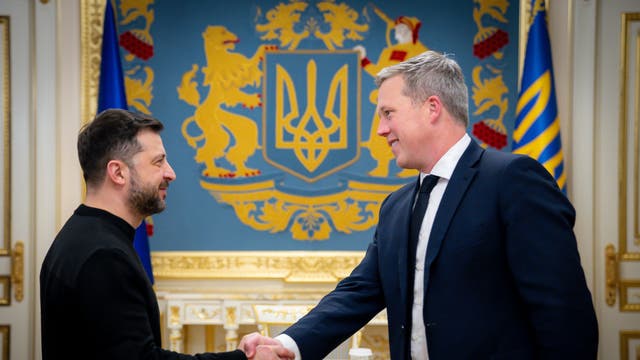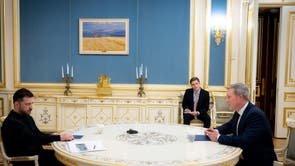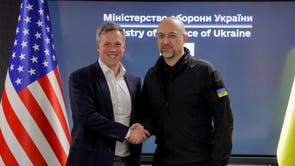- News
U.S. Army Secretary Dan Driscoll has become a key negotiator in the Trump administration’s push to end the Russia-Ukraine war
Ben Finley,Konstantin ToropinWednesday 26 November 2025 05:02 GMTUS Army secretary takes unlikely role as key negotiator in push to end Russia-Ukraine war
Show all 3



For free real time breaking news alerts sent straight to your inbox sign up to our breaking news emails
Sign up to our free breaking news emails
Sign up to our free breaking news emails
 Email*SIGN UP
Email*SIGN UPI would like to be emailed about offers, events and updates from The Independent. Read our Privacy notice
In a matter of days, Army Secretary Dan Driscoll vaulted from being the leader of a military bureaucracy — where he's been cutting red tape to quickly buy inexpensive drones — to a key negotiator in the Trump administration's push to end the Russia-Ukraine war.
The boyish Iraq War veteran, former venture capitalist and friend of Vice President JD Vance went from presenting President Donald Trump’s plan to Ukrainian President Volodymyr Zelenskyy in Kyiv to sitting down with Russian officials in the United Arab Emirates on Monday and Tuesday, heading up the latest phase of talks on a possible deal to halt the fighting.
Trump appears to believe Driscoll's efforts are going well, posting on social media that “my team has made tremendous progress.”
“In the hopes of finalizing this Peace Plan," Trump wrote Tuesday, “I have directed my Special Envoy Steve Witkoff to meet with President Putin in Moscow and, at the same time, Secretary of the Army Dan Driscoll will be meeting with the Ukrainians.”
It's an unlikely assignment for the Army's top civilian leader, who got the job in February at age 38. His Senate confirmation hearing focused on how the Army could modernize its systems, improve recruiting and beef up the military industrial base, not international diplomacy.
Tapping an unexpected diplomat
Driscoll only learned of his new role as a negotiator about a week before he was sitting across the table from Zelenskyy, a U.S. official said.
The official, who spoke on condition of anonymity to discuss sensitive plans, said Driscoll always had planned to visit Ukraine but the trip was aimed at learning more about how its military has been using drones in warfare, not to negotiate peace.
The official said after Driscoll was named as a special representative by the White House, he first traveled to Europe for briefings before heading to Ukraine.
There, Driscoll clasped hands with Zelenskyy and expressed admiration for Ukrainian soldiers, saying that even the most combat-hardened American troops “never had to defend their homeland.”
“When we the Army look and see how well you guys have done, it’s remarkable,” Driscoll told Zelenskyy last week. The Ukrainian leader said he spoke for almost an hour Friday with Vance and Driscoll about the proposal.
Driscoll’s performance in Ukraine seems to have paid off, because from there, he joined Secretary of State Marco Rubio, Witkoff and other top negotiators in Geneva to discuss changes to the plan with the Ukrainians before traveling to Abu Dhabi to negotiate with the Russians. The negotiations with Moscow were only a possibility just a week prior, the official said.
The Trump administration shakes things up
Some experts say his role in the negotiations is an out-of-the-box move by the Trump administration that may or may not pay off.
“I think what is helpful from this administration is its willingness to throw out ideas and try things,” said Max Bergmann, director of the Europe, Russia and Eurasia Program at the Center for Strategic and International Studies. But he added, “I had not heard of Dan Driscoll, to be frank, in Ukraine-Russia conversations at all.”
Driscoll's value is his connection to the vice president, Bergmann said. Driscoll has known Vance since law school at Yale University and previously served as Vance's adviser, giving the Army secretary a direct line to the Trump administration — and more leverage — during negotiations.
“There is something to be said about having someone who is probably texting with the vice president and therefore has that political juice,” said Bergmann, who served in State Department positions during President Barack Obama’s administration.
But Bergmann said there's also merit to having expertise, particularly on an issue as fraught as Russia's war with Ukraine: "The details really matter here.”
Daniel Fried, an Atlantic Council fellow who is a former U.S. ambassador to Poland, said Driscoll can overcome a lack of expertise if he has someone advising him. Plus, the fact that Driscoll is trusted by the administration is a notable asset.
“You don't want to have someone who reaches a handshake deal with the Ukrainians or the Russians and doesn't have the confidence of the upper reaches of the Trump administration,” Fried said.
Driscoll's aspirations as a politician
Driscoll's resume did not suggest he would be a top American negotiator trying to end the most protracted war in Europe since 1945, though he had aspirations to be a politician.
Driscoll told senators during his confirmation hearing that he “joined the Army as a middle-class public school kid from the mountains of North Carolina,” noting that his dad was an Army infantryman in Vietnam and his grandfather was an Army decoder in World War II.
“Most important, I intend to be the soldiers’ secretary of the Army, not of the generals or of the bureaucracy,” he said in his opening statement. “It is the American soldier to whom our national defense and prosperity are entrusted.”
He went to the University of North Carolina at Chapel Hill, enrolling in its business school and graduating in three years, according to a profile on the school's website.
Driscoll served in the Army as an armor officer for more than three years and earned the rank of first lieutenant. He deployed to Iraq from October 2009 to July 2010.
After law school, Driscoll worked for venture capital firms. He ran unsuccessfully in the Republican primary for a North Carolina congressional seat in 2020, getting about 8% of the vote in a crowded field of candidates.
Driscoll has some experience negotiating as Army secretary, involving the Army's need to continue using the only large-scale live-fire training range for ground forces in Hawaii so it can quickly send troops to Asia and the Pacific.
A May public hearing on whether to extend the lease generated hours of testimony against allowing the Army to stay. Many Native Hawaiians and environmental activists upset with the U.S. military’s history of damaging lands with target practice and fuel leaks said they wanted the land returned to the state.
Driscoll visited Hawaii in July to discuss the matter with Democratic Hawaii Gov. Josh Green, who said he spent significant time speaking to Driscoll and his team.
“Discussions are cordial and are still in the early stages," Green's office said this week.




